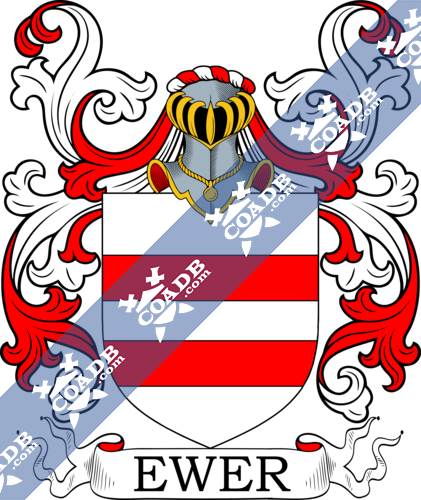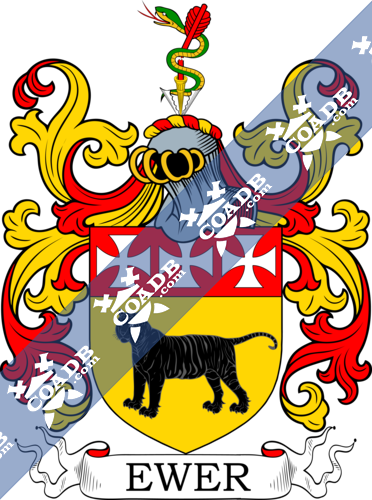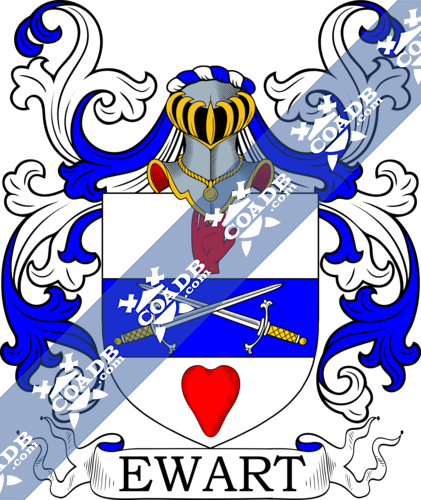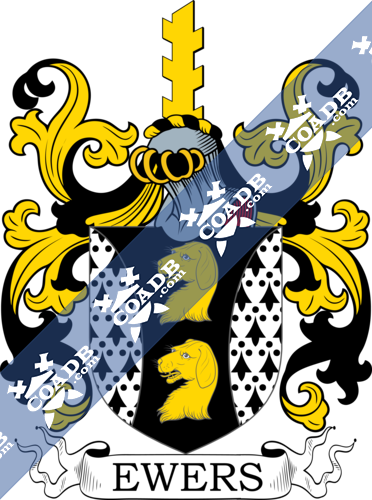Ewer Family Crest, Coat of Arms and Name History

Ewer Coat of Arms Gallery
Don’t know which Coat of Arms is yours?
We can do a genealogical research. Find out the exact history of your family!
Learn MoreEwer Origin:
England, France, Germany
Origins of Ewer:
This most interesting and unique surname has two possible origins. The first origin may be a nickname of “Ewer,” which itself is of early English origin, from the Middle English “ewer,” from the Old French “aiguier,” Latin “aqua,” which means water. It is a professional name for a servant who provided guests at a table with water to wash their hands. However, the name also appeared in Germany, where it is a Low German patronymic surname, acquiring from a particular Germanic name which was a combination of the components “eber”, which means wild pig, and “hard,” which means firm, hardy, strong. It has also given us the English surname “Everard,” which was originally found largely in East Anglia, having presented in the Germanic form by the Normans. Early examples of the surname contain as Richard Lewer, in the Feet of Fines of Surrey in 1219, Alexander Euer, in the Bedfordshire Premium Rolls of 1309 and Rober Lower, in the Record of the Freemen of the City of York in 1513. Robert Ewers was an early settler and landholder in Virginia in 1626.
Variations:
More common variations are: Yewer, Eweir, Ewery, Ewere, Euwer, Ewyer, Eweri, Ewero, Eiwer, Uewer.
England:
The surname Ewer was first found in Ayrshire, previously a division in the southwestern Strathclyde area of Scotland, that today makes up the Cabinet Areas of South, East, and North Ayrshire. One of the first recordings of the name was Adam Urri who shows as burgess of Irvine in 1260 and Huwe Urry of Ayrshire who distributed allegiance to King Edward I of England in his brief intervention into Scotland in 1296. Reginald Urry held land in Irvine in 1323 and William Urri retired the lands of Fulton in 1409. Another section of the family appeared in the Fetteresso church, Kincardineshire and for the most part, these names contained “de” expressing “of.” Hugh de Urre declared fealty at St. John of Perth and after that with a different spelling as Hugh Uny at Forfar, 1296. This next entry is probably another person giving homage to King Edward I.
The very first recording spelling of the family was shown to be that of Richard le Ewer, dated about 1185, in the “Records of the Tempars in England in the 12th Century”. It was during the time of King Henry II who was known to be the “The Builder of Churches,” dated 1154 – 1189. The origin of surnames during this period became a necessity with the introduction of personal taxation. It came to be known as Poll Tax in England.
Ireland:
Many of the people with surname Ewer had moved to Ireland during the 17th century.
United States of America:
Some of the individuals with the name Ewer who arrived in the United States in the 17th century included Elizabeth Ewer at the age of 4, arrived in New England in 1635. Sara Ewer at the age of 28, landed in America in 1635. Tho Ewer at the age of 1, landed in New England in 1635. Thomas Ewer, who landed in Massachusetts in 1636. Henry Ewer, who arrived in New England in 1637.
Canada:
Some of the individuals with the surname Ewer who came to Canada in the 18th century included Robert Ewer, who landed in Halifax, Nova Scotia in 1749-1752. Robert Ewer, who arrived in Nova, Scotia in 1749.
Here is the population distribution of the last name Ewer: United States 1,300; England 500; Australia 217; Canada 99; South Africa 73; Wales 45; Scotland 33; New Zealand 28; United Arab Emirates 23; Indonesia 14.
Notable People:
Hanns Heinz Ewers (November 1871 in Düsseldorf–June 1943 in Berlin) was a German artist, poet, scholar, and writer of short novels and stories. While he wrote on a wide range of subjects, he is now known chiefly for his works of horror, especially his trilogy of novels about the experiences of Frank Braun, a character modeled on himself. The best known of these is Alraune (1911).
Blazons & Genealogy Notes
1) (Luton, co. Bedford, and Lees-Langley, co Herts). (Bishop of Bangor, 1771). Or, a tiger statant sa. on a chief gu. three crosses pattee ar. Crest—A pheon or, headed ar. mounted on a broken dart gu. environed with a snake ppr.
2) Ar. two bars gu.








